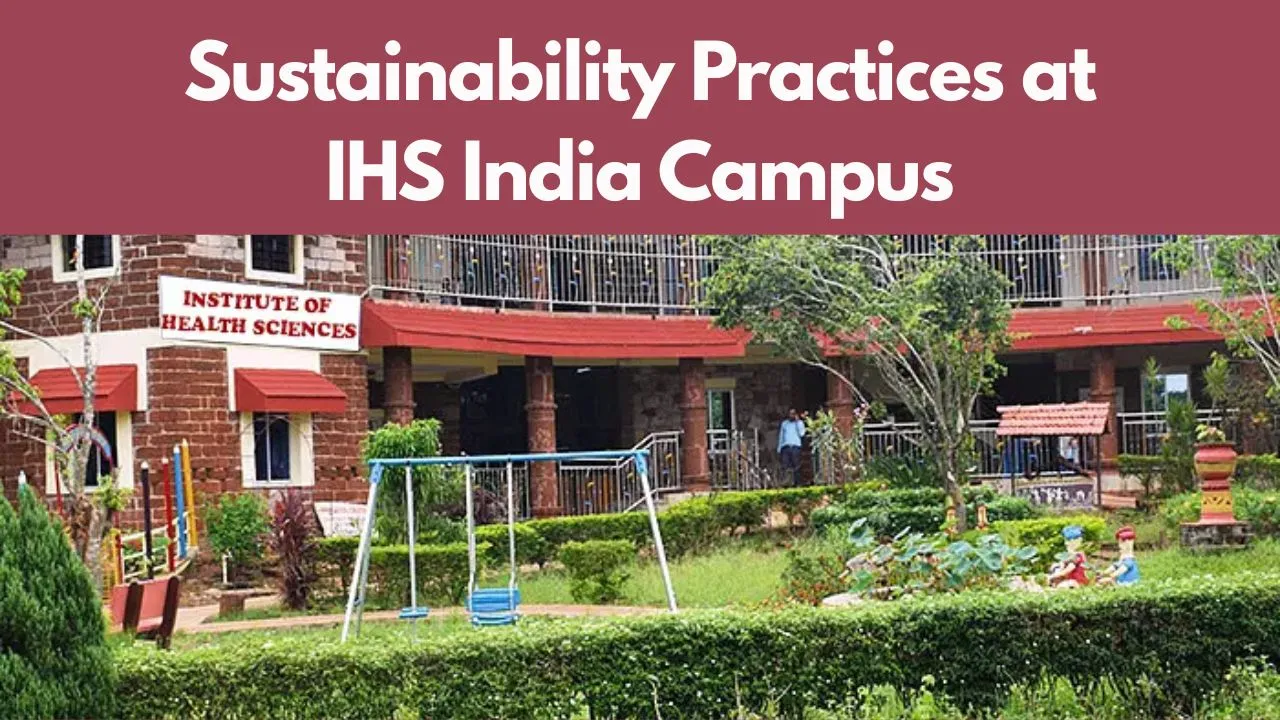Sustainability Practices at IHS India Campus: Sustainability Practices at IHS India Campus represent a meaningful and actionable shift towards building a better future. In today’s world, where climate change and environmental degradation are global concerns, academic institutions are stepping up to become models of green responsibility. IHS India has emerged as a forward-thinking campus that actively integrates sustainability into its everyday life.
This article dives deep into how IHS India has developed eco-friendly systems within its campus environment. From waste recycling programs and energy conservation strategies to green infrastructure and water-saving systems, the IHS India campus demonstrates a genuine commitment to minimizing its environmental footprint. Below, we’ll explore these initiatives in detail, with practical examples and ongoing efforts.
Sustainability Practices at IHS India Campus
The Sustainability Practices at IHS India Campus reflect a campus-wide commitment to creating an eco-conscious academic space. These practices aren’t limited to policies on paper—they are embedded into the physical infrastructure, operational routines, and campus culture. By using renewable energy sources, implementing strict waste segregation policies, and developing green architectural designs, IHS India sets a high bar for sustainable development in the educational sector. The campus actively involves students, faculty, and staff in long-term sustainability planning, ensuring a participative and enduring model that’s both measurable and impactful.
| Initiative | Details |
| Waste Recycling | Segregation at source, composting units, electronic waste channels |
| Energy Conservation | LED lighting, rooftop solar panels, motion sensors |
| Green Infrastructure | Eco-friendly building design, native plants, recycled building materials |
| Water Conservation | Rainwater harvesting, low-flow plumbing, greywater reuse |
| Digitalization | Reduced paper usage, cloud-based communication and documentation |
| Student Involvement | Eco-clubs, awareness campaigns, workshops, green week celebrations |
| Monitoring & Feedback | Sustainability audits, feedback collection, performance tracking |
Waste Recycling Initiatives
At the core of the sustainability practices at IHS India Campus is a highly organized waste management system. Waste generated on campus is systematically categorized into dry, wet, and electronic waste. Color-coded bins are placed in high-traffic areas, making it easy for students and staff to participate in proper disposal habits. This system reduces landfill dependence and ensures that materials with recycling potential are recovered efficiently.
The wet waste, largely from cafeterias and garden waste, is composted using in-house composting units. This compost is then used to fertilize the gardens and green spaces across campus, eliminating the need for chemical fertilizers. For electronic waste, IHS has partnered with certified recyclers to ensure that hazardous components are safely managed, promoting a circular economy approach.
Energy-Saving Measures
Energy consumption is a key factor in any institution’s environmental impact, and IHS India addresses this with a proactive energy-saving framework. LED lighting has replaced older, inefficient bulbs across the entire campus, reducing power usage significantly. These lights not only consume less energy but also last longer, cutting down on maintenance costs.
A notable feature of the sustainability practices at IHS India Campus is the installation of rooftop solar panels that generate a substantial portion of the electricity used in classrooms and administrative buildings. The integration of motion-sensor lights in hallways, restrooms, and less-frequented spaces ensures that power is used only when needed. Collectively, these efforts contribute to lowering the campus’s carbon footprint while setting a replicable standard for energy efficiency.
Green Infrastructure Development
IHS India’s green infrastructure is a model of low-impact development. The campus is thoughtfully designed to integrate sustainability into its very foundation. Buildings are oriented to maximize daylight and airflow, reducing the need for artificial lighting and cooling. This not only saves energy but also enhances indoor environmental quality for students and staff.
Rainwater harvesting systems are embedded into the campus layout, collecting runoff from roofs and surfaces. This water is filtered and used for landscape irrigation and sanitation, helping the institution conserve water resources. Walkways and paths are made using recycled construction materials, a move that reduces waste and supports resource conservation. Native trees and shrubs dominate the landscape, requiring less water and maintenance while supporting local biodiversity.
Two Key Eco-Friendly Highlights:
- Water Conservation Efforts:
- Dual-flush toilets, low-flow faucets, and water-efficient landscaping have helped reduce overall water consumption.
- Rainwater harvesting tanks and greywater recycling systems ensure that as little water as possible goes to waste.
- Dual-flush toilets, low-flow faucets, and water-efficient landscaping have helped reduce overall water consumption.
- Digitalization to Reduce Paper Waste:
- IHS India has transitioned many of its academic and administrative processes to digital platforms.
- Notices, class materials, and reports are shared electronically, significantly cutting down paper usage.
- IHS India has transitioned many of its academic and administrative processes to digital platforms.
Community Engagement and Education
The most powerful aspect of the sustainability practices at IHS India Campus lies in its people. The institution believes that long-lasting change is only possible when the entire community participates. To promote awareness and engagement, the campus regularly organizes eco-awareness programs, sustainability workshops, and student-led initiatives such as Green Week.
Eco-clubs serve as creative spaces for students to brainstorm and implement sustainability ideas. Competitions, plantation drives, and upcycling activities keep the enthusiasm alive and the learning continuous. Sustainability is not just taught—it is lived every day at IHS India.
Monitoring and Continuous Improvement
Sustainability is an ongoing journey, not a destination. At IHS India, regular internal audits are carried out to assess the effectiveness of existing sustainability initiatives. These audits examine energy usage, water consumption, waste management performance, and community participation.
What sets the campus apart is its feedback loop. Faculty, staff, and students are encouraged to provide insights and suggestions to improve existing systems. These inputs are then reviewed and used to make real-time upgrades or changes. This culture of continuous improvement ensures that the sustainability practices at IHS India Campus evolve with changing environmental demands and technological advancements.
FAQs
Q1. What makes the sustainability efforts at IHS India different from other campuses?
The campus integrates sustainability into both infrastructure and culture. Real-time monitoring, student involvement, and renewable energy use set it apart.
Q2. How does IHS India handle electronic waste?
E-waste is collected separately and sent to certified recyclers for safe and responsible disposal.
Q3. Are there any student programs that promote environmental responsibility?
Yes, eco-clubs, Green Week, and workshops engage students in hands-on sustainability activities and awareness.
Q4. What role does digitalization play in reducing environmental impact?
By using digital platforms for documents and communication, the campus reduces its reliance on paper, saving trees and cutting printing waste.
Q5. How is water used efficiently on the campus?
The campus uses rainwater harvesting, water-efficient fixtures, and reuses treated greywater for gardening and maintenance tasks.
Final Thought
The sustainability practices at IHS India Campus demonstrate that responsible environmental management can be seamlessly integrated into academic life. Through thoughtful infrastructure, clean energy use, and community-driven initiatives, the campus provides a powerful example of how institutions can lead the way in environmental stewardship. These efforts are not only protecting the planet but are also shaping future leaders who value sustainability at their core.
If this vision aligns with yours, feel free to share your thoughts or experiences in the comments below. Explore your eco-conscious personality and discover more green insights tailored just for you.







